QuestionQUESTION: sorry about last night i should have included the questions to so
Can you answer the following Questions please?
Should I move the two girl cats to different rooms ?
Will the boys hurt them or the kittens ?
What should I expect to happen when she goes into labor?
What is the average number of kittens if she has more is that bad?
When will she get her milk?
Do you think that she will let me hold one?
Will she be aggressive?
Can you give me a guess how far she is i do not know when she mated?
What to do if a baby comes out in a black or bloody sack?
What is the main things to look for to know the kittens are okay before and after she gives birth?
I know that is a lot of questions but this is my first time to have a cat have kittens and i do not know what to do for her or them
I am just a little scared
Here is what is going on i have 2 pregnant cats motly and sassy
Motly is about as big around as a cantaloup or soccer ball, and her nipples have pinked you can lay at her level and see and feel the babies kicking on her tummy she has no signs of milk she loves for her tummy to be petted until about 48 hours ago she got tender. She is a very easy going cat. And the boys keep hissing and jumping on her when she is just laying on the floor. She has been eating about 3 to 4 times the normal but what is strange is she eats like 10 or 12 pieces at a time then like 5 minutes later the same thing again.
NOW
Sassy is just showing the enlargement of her tummy and her nipples are pink and kind of big. She just showed back up after leaving with a stray for about 3 months then came back expecting kittens. now she wants all the attention on her and she eats a lot of food.
The two cats fight sometimes and sleep beside each other sometimes just depends on how Motly is feeling
ANSWER: Daisy,
The queens should be kept away from the male cats in your household starting immediately since you aren't sure when they became pregnant or when to expect the kittens. It's not a bad idea to try housing the moms to be in separate rooms, this will prevent any fighting and potential injuries if the queens become protective of their litters. Male cats should be kept completely away from the queens and their newborn litters after the kittens are born because they have been known to kill litters of kittens in order to ensure that the queen goes into season more quickly which means that they will have an opportunity to mate sooner than they would if the mother cats raised and weaned their babies. Unfortunately I can't tell you when the kittens are due, a vet could probably give an educated guess based on x-rays or ultrasounds of each queen's pregnant belly.
Some new mothers are very protective of their litters although if you have a good relationship with the queens you shouldn't have any difficulty paying attention to each mother and their kittens. It's very important for you to handle the kittens from an early age as this helps with socialization so that these babies have the best chance of going into a good home. Newborn kittens have very little resistance to viral/bacterial infections especially if their mom hasn't been vaccinated so it's important to make sure that the kittens are kept in the cleanest environment possible.
I think that it's a good idea to start preparing the boxes for the kittens to be born in. I recommend that you try using a cardboard box that is roughly two feed long and a foot and a half wide. You will need to cut a notch in the front of the box that measures roughly 6 inches wide to allow mom to come and go comfortably as often as she wishes while keeping the babies safe and contained. I'd recommend using a disposable incontinence pad to line the bottom of the box, this will absorb the amniotic fluid and blood from the birthing process. On top of the incontinence pads (which you can buy in bulk from a store like Walmart) you will want to have some clean towels or rags, just be sure that it's okay if they get stained. The bedding needs to be kept clean and dry so you will need to change the incontinence pad and the bedding regularly to be sure that the kittens are kept warm and dry. The birthing boxes should go into an area that's quiet, dimly lit and private, cats tend to give birth in places like dark closets or under beds so you should find a place for the birthing box with that in mind.
Many cats will give birth during the night and for the most part there aren't too many cases where the queen needs help to bring her babies into the world, that's why there is a serious pet overpopulation problem facing shelters and rescue organizations. You may notice that the queens start acting restless, they may become more vocal and pace. Many queens will look for areas to have their babies, they won't always use the box that you've prepared so you shouldn't try to force them to do so. Over all it's best to avoid interfering with the birth process, moving about too much or making too much noise - you can cause your cat's labor to stall which may require her to see a vet immediately and she could require a caesarian to deliver the babies and save her life. Labor is a perfectly natural process and most queens will know what to do instinctively so if you want to observe I'd recommend that you do it quietly, calmly, keeping the number of people to a minimum and avoid taking pictures as this can be disruptive and cause complications like the labor stopping and the queen needing a caesarian.
It's perfectly normal for a queen in labor to pant or yowl loudly, especially if this is her first litter so don't panic if these things happen. If you notice that a queen has been pushing for more than an hour without producing a kitten it's best to pack her off to the vet with any kittens that have already been born so that she can receive the appropriate medical treatment or assistance. If you notice a greenish watery discharge from the mother cat's vagina it may be an indication that the placenta has separated too early, this can mean that the affected kitten may die if s/he isn't quickly delivered. A black or bloody sac can be an indication of issues with the placenta, sometimes there isn't anything that can be done to save the kitten. If mom seems overly anxious hours after the delivery and she doesn't seem to want to be still to care for and feed her kittens it could be an indication that someone has been left behind, this is a medical emergency and it requires treatment by a qualified vet. In the event that the queen starts to bleed a fair bit from her vagina she needs to see a vet, normally the birth process results in very little bleeding, it's mostly fluid from the amniotic sacs and blood from the placentas.
If there's any doubt about the condition of the mother cat or her kittens it's important to seek medical care for them because there can be serious complications from giving birth. An average first time litter is around 3/4 kittens, if mom only has one I'd recommend a vet visit to confirm that there aren't any babies stuck in the birth canal or uterus, if mom has more than 6-8 kittens she may require help feeding them, but again this is something that should be determined by a vet. If you notice that mom seems to be walking with a stiff gait or she shows anxiety it's possible that she has a calcium/magnesium deficiency which can happen with a nursing queen, this is another situation where veterinary care must be obtained immediately or your queen may die. When the kittens are born the mother will generally lick them to clear their airways and stimulate their breathing, it's also perfectly normal for her to eat the amniotic sac and placenta from each kitten.
Normal, healthy kittens will generally find their way to their mother's belly and begin nursing fairly soon after birth, if the kittens seem quite vocal and squirmy their mother may not be producing enough milk to satisfy their appetites. If this happens it's a good idea to take mom and her babies to the vet, it's possible that a hormone shot will help mom let her milk down. If the mother cat doesn't produce enough milk to feed her kittens then you may have to step in and feed them a kitten milk replacement formula with a syringe. I can provide instructions on hand rearing kittens if necessary.
Kittens should stay with their mother and siblings for a minimum of 10-12 weeks, this allows them to become socialized, build up their immune systems, learn how to respect limits set by siblings, their mother and their human caregivers. I suspect that Motly may be close to delivering her babies simply because of her size and the fact that she seems tender in the tummy area. I do think that both mother cats should see a vet immediately, this will be important to make sure that everything is okay and everybody is healthy. Handling the kittens should be done regularly in the first few weeks of their lives, it helps them to become comfortable with human beings which makes them more likely to go to good homes.
It's very important to make sure that you wash your hands thoroughly before handling the kittens or their mother to prevent any possible spread of viral or bacterial infections because a new mom and kittens are quite vulnerable, especially if the mother cat hasn't received vaccinations. The kittens will receive antibodies in their mother's milk within the first few days of their lives, this milk is called colostrum and it's very important that all of the kittens get some. Once both queens have had their litters you will need to wash your hands thoroughly after handling each family before handling the others.
It's very important to stay on top of things like clean bedding as this will help prevent mom from getting an infection after giving birth and clean bedding will help keep the kittens warm and healthy. I recommend scooping the litter boxes and washing food/water bowls daily. It's a good idea to thoroughly disinfect the litter box and food/water bowls at least once a week using a weak bleach solution (5 parts water to 1 part bleach). I don't expect that the queens will become aggressive with you after their kittens are born if you are their regular caregiver and have a good relationship with them, but they may become quite aggressive with other cats as a way of protecting their babies so it's very important to keep the other cats away from the queens and their new families. It's important to make sure that you have a kitten sized litter box in each room with the queens and kittens, this will allow mom to potty train the kittens when they're ready. You may help potty train the kittens if you like, this means that when they wake up from a nap, eat or play you'll gently place them in the litter box over and over again until they do their business. Potty training kittens can require patience, but it's far easier than potty training a puppy. Mother cats do not require help weaning their kittens, they'll do so on their own when they're ready. Just because a kitten can eat solid food doesn't mean that s/he is ready to be taken away from mom. I have a little recipe I feed any kittens around the time that they're starting to eat solid food and if you'd like that information I'd be more than happy to share it so that these new babies can have the healthiest start possible in life.
Given the fact that there is an extremely serious pet overpopulation problem worldwide I'd highly recommend that you have the boys neutered ASAP. Spaying and neutering pets is an ethical choice that saves countless lives every year and it has several medical and behavioral benefits. Cats that are sterilized are less likely to develop serious behavioral problems such as using urine/feces to mark their territory which can result in euthanasia. Intact tom cats can be quite aggressive with other cats, this means that they can inflict serious injuries on other intact male cats which can require veterinary care.
Cats that haven't been spayed/neutered are also more likely to roam, be hit by a car, be attacked by wild animals, be accidentally or intentionally poisoned and they can also become the innocent victims of terrible acts of animal cruelty. The medical benefits that go along with sterilizing cats include the prevention of testicular, ovarian and uterine cancers. Spayed/neutered cats also don't have to endure infections in their reproductive tract or mammary glands. Unspayed female cats are far more likely to develop breast cancer than a queen that has been sterilized. Queens can also fall victim to a potentially fatal uterine infection called pyometra, this infection causes the uterus to fill with pus, if it ruptures there's very little chance of the cat surviving. If there is financial difficulty with spaying/neutering all of your pets I can help you to find resources within your community that may be of help. I would need to know the province/state that you are in to find information like that because I keep a binder of resources that will help pet parents with limited finances obtain basic vet care such as spay/neuter surgeries, vaccines, annual vet visits and there are other resources which focus solely on helping pet guardians whose pets are in need of immediate emergency vet care.
---------- FOLLOW-UP ----------
QUESTION: Just want to say that was very good and i have on litter that is 9 days old and another still not born yet. But should the kittens open thire eyes yet and why has the mom been "talk" to the kittens sence they have been born
ANSWER: Daisy,
Glad to hear that the advice worked out. As for the kittens they should be opening their eyes soon, usually before 14 days of age at the latest. Mom is being a mother and speaking to her babies, this is the same across all species, mothers communicate with their babies to strengthen the bond, offer comfort and reassure their babies. It`s perfectly normal and indeed desirable it shows that mom is being a good mom.
I do believe that I emphasized the importance of ensuring that both mother cats are kept indoors and away from intact male cats. It`s important to have both moms spayed as soon as possible to avoid continuing to contribute to the serious pet overpopulation problem worldwide and ensure that the moms have the longest, healthiest lives possible without the chance of being euthanized due to serious physical health problems or common behavioral issues typically found in intact cats.
---------- FOLLOW-UP ----------
QUESTION: When she had her babys she had the first one in the middle of the main room of the house she was going to have the rest there but my aunt would not let her. (I was not at home at the time) They are all doing real good they are starting to walk a little and hiss but the runt is like an inch shorter than the rest of the kittens and has not really grown much my be 1/4 of an inch the rest have grow about 1 inch or 1 1/2 inchs. Is this normal for the runt
AnswerDaisy,
So long as the runt is feeding properly everything should be fine. By definition the runt of the litter is often somewhat smaller than his or her litter mates simply because there is only so much room in the cat's uterine horns to accomodate kittens and the resources, nutrition, space and blood flow sometimes aren't distributed 100% evenly. So long as the kitten does what newborn kittens are supposed to do which is primarily to eat and sleep everything is okay. It's important to keep this new litter separated from the older litter to avoid potential problems with the older kittens accidentally hurting the newborns or one of the mothers ending up with no litter to nurse due to the fact that sometimes in living situations where there are multiple litters one mother may decide that she is best able to provide for all of the kittens and remove them from their mother's care. It sounds like these kittens are overall fairly spunky and in good health, just keep an eye on the smaller kitten to make sure that s/he is getting his or her fair share of food. If there is a problem and the runt isn't getting enough food you may have to supplement his/her diet with a commercially available kitten milk replacer such as Just Born, Mammalac or KMR. If the runt isn't getting enough to eat s/he will likely become squirmy and more vocal than the other kittens and if you do resort to feeding this baby a bit of formula each day be sure to add some organic, unsweetened plain yogurt to the formula to prevent diarrea and try to keep the kitten away from mom for the least amount of time possible. I can offer instructions on how to feed formula if it comes down to it.

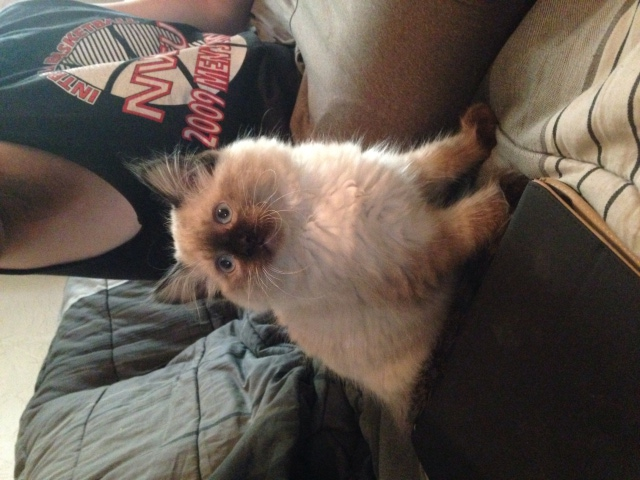 What kind of cat do I have? What should I breed her with?
Question
What kind?
The people we got my cat fro
What kind of cat do I have? What should I breed her with?
Question
What kind?
The people we got my cat fro
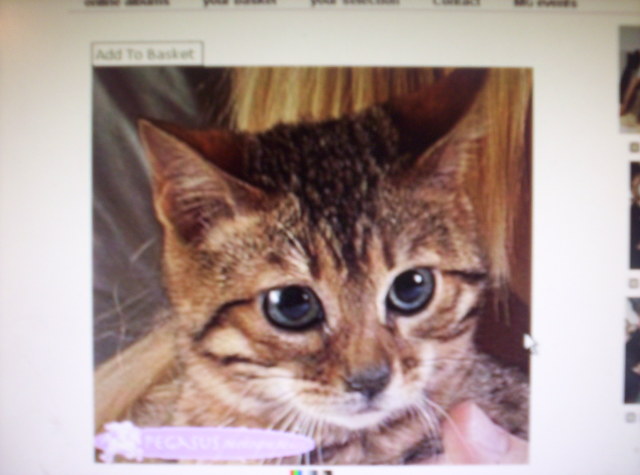 tatty kitten
QuestionQUESTION: Hi i have adopted a bengal kitt
tatty kitten
QuestionQUESTION: Hi i have adopted a bengal kitt
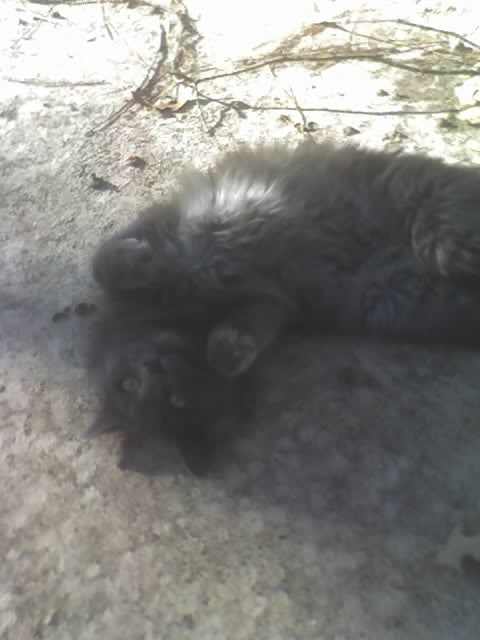 shots/food
QuestionQUESTION: Teresa,
Silver is a wild kitten we he
shots/food
QuestionQUESTION: Teresa,
Silver is a wild kitten we he
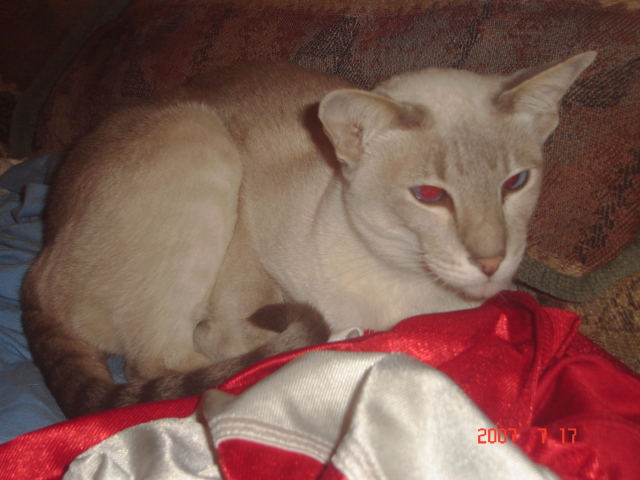 Siamese tracks feces around the house
Question
Dirty Foot
I recently adopted a wonderf
Siamese tracks feces around the house
Question
Dirty Foot
I recently adopted a wonderf
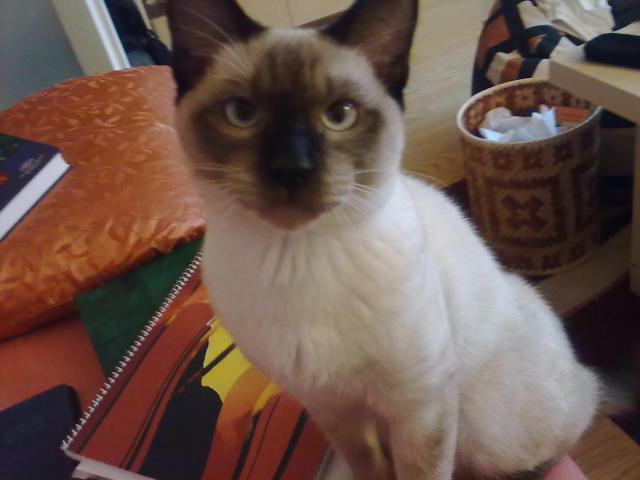 Siamese genetics
Question
my cat
Hello!
I would like to ask a seriously
Siamese genetics
Question
my cat
Hello!
I would like to ask a seriously